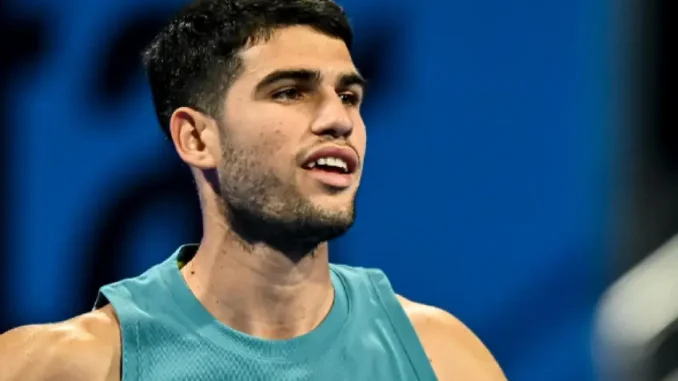
Becker’s Defense: Standing Up for Alcaraz Amidst Criticism
The world of professional tennis is a demanding arena, where physical and mental fortitude are tested to their limits. Recently, Carlos Alcaraz, the young Spanish sensation, found himself under scrutiny following a surprising loss in Doha. His performance, marked by what some perceived as a physical collapse, drew criticism from various quarters, prompting tennis legend Boris Becker to step forward in defense of the young star.
Alcaraz’s rise to prominence has been nothing short of meteoric. His explosive style of play, combined with his undeniable talent and infectious enthusiasm, has captivated audiences worldwide. He has quickly established himself as one of the top players in the game, a force to be reckoned with on any surface. However, even the most talented athletes can have off days, and Alcaraz’s recent performance in Doha served as a reminder of the human element in sport.
The loss itself was unexpected. Alcaraz, the top seed and a favorite going into the tournament, fell to his opponent in a match that saw him struggle physically in the latter stages. He appeared visibly fatigued, his usual energy and explosiveness diminished. This apparent decline in his physical condition led to speculation and criticism, with some suggesting that he was not adequately prepared or that he had perhaps succumbed to the pressure of expectations.
It was in this context that Boris Becker, a six-time Grand Slam champion and a respected voice in the tennis world, offered his support for Alcaraz. Becker, known for his forthright commentary and his understanding of the pressures faced by top athletes, defended Alcaraz against the critics. He emphasized the demanding nature of professional tennis, highlighting the physical and mental toll that the sport can take on even the most seasoned players.
Becker’s defense of Alcaraz went beyond simply acknowledging the physical challenges of the game. He also addressed the mental aspect, pointing out the immense pressure that young stars like Alcaraz face. The expectations placed upon their shoulders, the constant scrutiny from the media and fans, and the relentless pursuit of success can all contribute to a significant mental burden. Becker, having experienced these pressures himself during his own career, understands the challenges that Alcaraz is facing.
“Tennis is not just about hitting the ball,” Becker stated, emphasizing the multifaceted nature of the sport. He stressed the importance of mental resilience, the ability to handle pressure, and the capacity to bounce back from setbacks. These qualities, he argued, are just as crucial as physical prowess in determining success in professional tennis.
Becker’s comments serve as a reminder that athletes are human beings, subject to the same vulnerabilities and fluctuations in performance as anyone else. They are not machines, programmed to perform at peak levels every time they step onto the court. They can have good days and bad days, and sometimes their bodies or minds simply cannot perform as expected.
The criticism leveled against Alcaraz following his loss in Doha highlights the often unforgiving nature of sports fandom. Fans, understandably, want their favorite players to win every match, to always be at their best. However, this expectation is often unrealistic and fails to recognize the inherent unpredictability of sport.
Becker’s intervention in the Alcaraz situation is a valuable contribution to the conversation surrounding athlete well-being. He reminds us that athletes deserve our support and understanding, even when they fall short of our expectations. Criticism is a part of professional sport, but it’s important to ensure that it is constructive and not simply a means of tearing down athletes for their occasional lapses in performance.
The pressure on young stars like Alcaraz is immense, and it’s crucial that they have the support and guidance they need to navigate the challenges of professional tennis. Mentors like Becker, who have experienced the highs and lows of the sport, can play a vital role in helping young players develop not only their skills but also their mental resilience.
Alcaraz’s career is still in its early stages, and he has already achieved remarkable success. His loss in Doha, while disappointing, should not be seen as a sign of decline or a reason for excessive criticism. It’s simply a reminder that even the best players can have off days. With the support of experienced figures like Becker, and with his own talent and determination, Alcaraz is sure to bounce back stronger and continue to achieve great things in the world of tennis. His journey is just beginning, and the future remains bright for this young star.
Leave a Reply